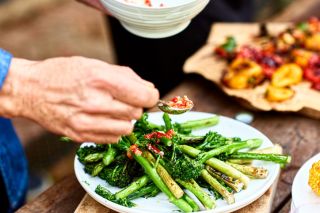
A healthy diet should include adequate vitamin C, antioxidants, fiber, and other nutrients. Whole grains have many B vitamins. They are known to lower cholesterol and protect against heart disease and diabetes. Yogurt contains probiotics and live cultures which are good sources of calcium and protein. They also protect your body from harmful bacteria. Yogurt is great for boosting vitamin intake.
Because of their omega-3 oils, walnuts are one of healthiest foods. They have been found to lower cholesterol levels and promote muscle recovery after exercise. Another good option is peanuts. A study conducted in the US revealed that 90 grams of peanuts each day can reduce blood fat up to 25%, while not increasing weight. Nuts can be eaten as snacks or added to salads or cereals. Avoid unsalted nuts as they can encourage overeating.

Bananas have been voted one of the healthiest foods. Bananas are easy to find and can easily be found anywhere. They are also inexpensive and contain almost all of the vitamins you need. Bananas can also be added to any other meal. You can even add a slice to your morning smoothie. Bananas are great with any type of food. This is the best of both. But they're not the only healthy foods. Listed below are some of the best.
Broccoli is another food that is rich in vitamin C and folate. It's no wonder that it's often listed on "superfood" lists. It contains a special antioxidant called sulforaphane, which has been proven to help fight cancer and boost the body's detoxification enzymes. Broccoli, in addition to being an important food for good health, is also rich in nutrients and fiber.
Yogurt is one the best foods for your health. Yogurt is made of milk that has been fermented and infused with live bacteria. It is high in healthy fats and has yogurt as a side effect. Extra-virgin Olive Oil is one the most healthy vegetable oils because it has heart-healthy monounsaturated oil. Coconut oil on the other side contains saturated fat, but has many health benefits.

Vegetables as well as beans and legumes are good sources of dietary fiber. Amino acids are found in legumes, which can help you feel fuller for longer durations of time. They can also be used as meat substitutes. Those looking for the best foods for health should consume five to seven servings of green vegetables a week. A healthy diet should contain a variety different fruits and vegetables. Vegetables, fruits, and legumes are good for your health.
FAQ
What is the best way to increase muscle mass?
There are two main things you must do when building muscle mass. These include isolation exercises and compound movements. While isolating exercises target specific muscles, compound movements are designed to focus on multiple muscle groups at once.
It is important to do exercises that work all of your major muscles groups. This ensures that you are always working hard during each session.
To keep track of what you have done, use an app called MyFitnessPal. It can track everything from calories burnt to weight lifting. You can also create custom meal plans based on your goals.
Egg is good for you?
The egg contains all the nutrients required by the human body. It aids in maintaining strong bones, healthy hearts, and lungs, as it also maintains stable blood pressure.
Eggs are a great source of protein, vitamins A and B12, D. E. K, calcium, magnesium, selenium and riboflavin.
The egg yolk contains high levels of cholesterol. However, it doesn't contain saturated fat. Eggs contain less saturated fat than most other foods.
In addition, they are low in sodium and calories. They are very versatile and can be cooked any way you'd like. They can be poached or scrambled, baked, hard-boiled, or fried.
They are incredibly nutritious and easy to prepare.
Aim to eat two whole eggs per week. If you dislike eating eggs, you should add them to your diet.
Eggs provide essential nutrients needed by our bodies. You can add eggs to your daily diet now.
How to Build Muscles Fast
The best way to quickly build muscle is to eat healthy and exercise regularly.
It is best to exercise in the morning, when you feel fresh and ready to go!
Exercises such as push-ups and bench presses are good options.
Try different weight training routines, and don't forget to drink plenty of water throughout the day.
What kind of food should I avoid when trying to lose weight?
Avoid trans fats. Trans fats raise LDL (the bad) cholesterol levels and reduce HDL (the good) cholesterol levels.
Trans fats may be found in deep-fried, fast food, packaged bake goods, snack cakes, or other processed food.
These unhealthy fats also contribute to inflammation, leading ultimately to heart disease or diabetes.
Foods containing artificial sweeteners should also be avoided. Artificial sweeteners can increase your risk of developing cancer.
These chemicals are found in many products, including soft drinks, candy bars, chewing gum, as well as candy bars. They appear in many other foods, including meat, poultry, fish, and eggs.
Artificial sweeteners can be saccharin or cyclamate, sucralose, sorbitol or aspartame.
These chemicals can damage DNA and cause cell death, according to the American Heart Association.
Statistics
- According to the American Academy of Dermatology (AAD), men over 50 are at a heightened risk of developing it. (healthline.com)
- Get free shipping and 25% off today. (healthline.com)
- Cardmembers earn 5% Back at Amazon.com with a Prime Credit Card. (amazon.com)
- The PRS enabled risk stratification for overall prostate cancer and lethal disease with a four-fold difference between men in the highest and lowest quartiles (HR, 4.32; 95% confidence interval [CI], 3.16-5.89). (pubmed.ncbi.nlm.nih.gov)
- An estimated calorie range for moderately active adult males falls between 2,200 to 2,800 calories per day, depending on age. (eatright.org)
External Links
How To
What nutrients does a man need daily?
Daily nutrition is essential for men's healthy growth. The body needs vitamins, minerals as well as proteins, carbohydrates and fats.
You also need specific nutrients for different times in the day. When you're sleeping, your body uses energy from food for hormones, proteins, and enzymes. Protein is needed to build muscles and repair tissue damaged when you wake up.
Your body burns fat at night and stores it as energy as glycogen. Your body still requires sufficient nutrients and calories even though it needs less calories. You can have a snack at night if you feel hungry.
For your body to function properly, it needs adequate amounts of protein and carbs. After a hard workout, muscle soreness may occur.
To prevent this, you must consume carbs and protein within 2 hours of training. Your body will breakdown stored glycogen and provide you with glucose for energy.
After your workouts, you should eat protein immediately. This prevents muscle tissue being destroyed while you're sleeping.
Your body can produce lactic acid during intense physical activity. Your body can build up lactic acid in the bloodstream which causes fatigue. To avoid this, you should eat foods rich in carbohydrates, such as fruits and vegetables.
Carbohydrates give your body the energy it needs to recover from strenuous exercise.
In addition, you may want to include lean meats, fish, eggs, milk, cheese, yogurt, beans, nuts, and seeds into your diet.
All of these foods have high-quality protein. Protein helps to repair and grow muscles. Protein is also necessary for the production of sex hormones such as testosterone.
For healthy skin, hair and joints, it is important to eat enough fats. Healthy men need between 20% - 35% of the total caloric intake to be fat.
Fat helps keep your heart strong and protects against cancer. Your brain also functions properly thanks to fat.
Vegetable oils such as sunflower oil and soybean oil can provide most of your fat needs.
These oils have high amounts of monounsaturated oil fatty acids, (MUFAs). MUFAs reduce cholesterol and inflammation. They protect your cells from damage by free radicals.
Saturated oils (SFAs), found primarily in animal products such meats, dairy products and butter, are known to raise LDL ("bad") cholesterol. SFAs are known to raise LDL ("bad") cholesterol and raise triglycerides. They promote weight gain and abdominal fat.
Plant-based oils such as vegetable oil, nuts, seeds, or grains are rich in polyunsaturated fats (PUFAs). PUFAs help improve cardiovascular function, and lower inflammation. They also help control blood sugar and cholesterol.
Men with low HDL ("good") cholesterol often suffer from erectile dysfunction. Saturated fats are a major source of bad cholesterol. This lowers good cholesterol.
Men who eat a lot of red meat or pork develop prostate problems because they contain large amounts of nitrates. High temperatures can cause nitrates to become nitrosamines. These compounds can cause cancer.
Many processed meats are high in nitrites, and other dangerous chemicals. They should be avoided.
The American Heart Association suggests that no more than two servings per week of red meat should be consumed. Choose poultry, fish and legumes instead.